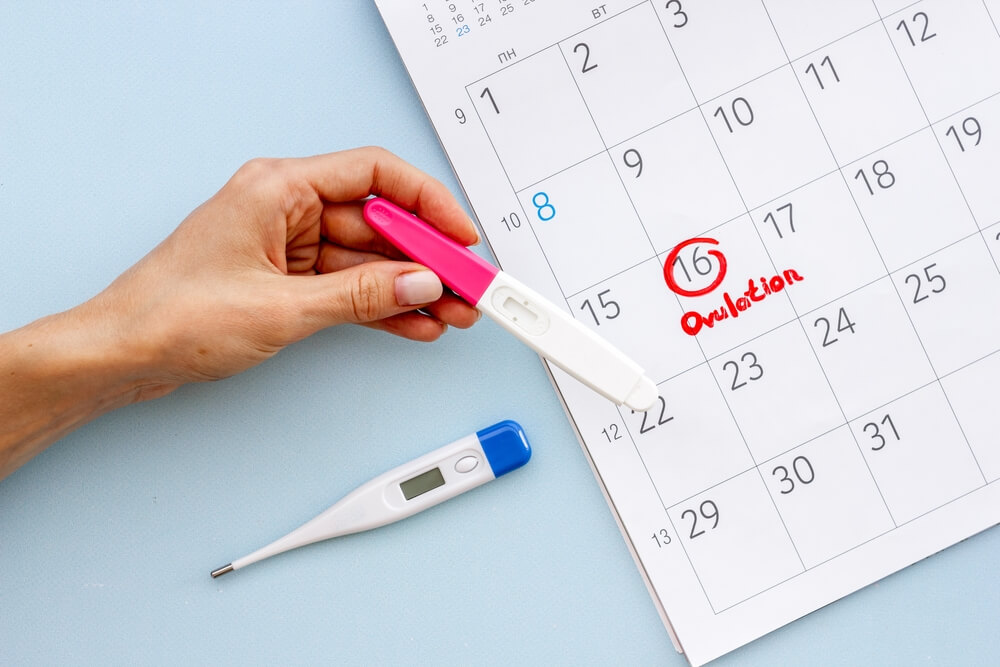The menstrual cycle can be complicated and unpredictable, which is why it’s important to be in tune with your body for the whole month. Ovulation disorders are just one of the things that can make your cycle harder to deal with. Aside from that, they are the most common reason behind fertility issues as they impact the production of reproductive hormones. This article will help you understand your symptoms better, cover the most common disorders, and give you possible solutions.
What Puts You at Risk For Ovulation Disorders?
A number of factors can cause disorder symptoms to develop. While most disorders come with their own specific set of symptoms, you are at a higher risk of developing them if you:
- Are overweight or underweight
- Have started taking new medication
- Are a smoker
- Are over 30
- Have a history of STIs
If you believe you might be at risk, use a monthly ovulation test to determine whether your ovulation is irregular or missing. This can be the first sign of a potential disorder.
What is Hypothalamic Amenorrhea?

The two most important hormones for getting pregnant are the luteinizing hormone (LH) and the follicle-stimulating hormone (FSH). In the usual process, FSH is released during your cycle, signaling a need for a follicle to mature into an ovum. LH levels begin to rise, and FHS levels begin to decline as the follicle releases a matured egg.
In cases of hypothalamic amenorrhea, the woman doesn’t have enough fat content or nutrients to trigger the ovulation process. Thus, ovulation is either missing or irregular, and the normal hormonal process is interrupted.
Symptoms of hypothalamic amenorrhea include:
- Increased appetite
- Difficulty falling or staying asleep
- Anxiety and depression
- Very light or missing periods (most common symptom)
- An increased sensitivity to cold
- Decreased sex drive
Is There a Way to Treat Hypothalamic Amenorrhea?
If you believe you have this disorder, you can make several lifestyle changes to treat it. Mainly, you should focus on reducing stress in your life and maintaining a healthy weight. Sudden weight changes and excessive emotional or physical stress are the two most common reasons for developing this disorder.
What Is Primary Ovarian Insufficiency?
POI also referred to as premature ovarian failure (POF), is the onset of menopause before the age of 40. The ovaries simply stop producing estrogen, causing issues with your ovulation and fertility. Primary ovarian insufficiency usually means that there are no functioning ovarian follicles left or they’re not working as they should.
Causes of POI are still largely unknown, but it is believed the disorder is the body’s autoimmune response to chemotherapy. As well as that, the root of POI could lie in your family history and genetics.
Symptoms of primary ovarian insufficiency:
- Lowered libido
- Vaginal dryness
- Hot flashes
- Irregular or missed periods
- Difficulty concentrating and increased irritability
- Night sweats
- Difficulty conceiving
Is There a Way to Treat Primary Ovarian Insufficiency?
There are several ways to treat this disorder so you can still live a normal life and conceive. You can start with taking vitamin D and calcium supplements, as women with POI are at a higher risk of developing osteoporosis.
As well as that, some lifestyle changes like exercising regularly and maintaining your weight can help regulate the symptoms and lower your risk of heart disease and osteoporosis.
Hormone replacement therapy is the most common direct treatment of this disorder, though. It can supplement the estrogen your body is missing and improve your sexual health. IVF is also a way you can increase your chances of conception.
However, none of these changes to your life should be made without consulting Dr. Damaris Miranda or any other of our friendly specialists.
What is Hyperprolactinemia?
Prolactin is a hormone that causes milk production in and after pregnancy and breast growth in general. Moreover, this hormone helps regulate your cycle even if you’re not trying to conceive. When you have hyperprolactinemia, it means that there is too much prolactin in your blood.
Defined like that, the disorder mainly refers to women who aren’t pregnant. It can cause milk production and conception issues, as it affects the production of other hormones responsible for ovulation.
Symptoms of hyperprolactinemia include:
- Irregular, absent, or long cycles
- Infertility
- Abnormal hair growth
- Breast milk production or discharge
- Headaches, vision problems
- No ovulation
Is There a Way to Treat Hyperprolactinemia?
This condition can be caused by several different reasons, including other conditions such as hypothyroidism. Certain foods, herbs, and lifestyle habits such as too much exercise can onset prolactin’s overproduction.
Regardless of what’s causing the issue, the treatment options include medicine such as cabergoline and bromocriptine, as both lessen symptoms and increase the chances of conception.
Could It Just Be Weak Ovulation?
Weak or suboptimal ovulation refers to having a hormonal disbalance, mainly concerning your progesterone and estrogen levels. A hormonal disbalance caused by weak ovulation can lead to missed and irregular ovulation and can be the reason behind your inability to get pregnant.
A simple ovulation test can help determine when you’re ovulating and get you more familiar with your body. According to the test, marking the days of ovulation can also help you track your cycle more accurately.
Weak ovulation treatment is absolutely possible with proper care and advice from your doctor. After treatment and adequate care, women can still have happy and healthy pregnancies.
Do You Have a History of PCOS?
Polycystic ovary syndrome is a relatively common disorder that affects your cycle and fertility. It occurs when you spike your testosterone levels or a drop in insulin receptivity. If you have a history of this disorder, it could affect your fertility and overall well-being.
If you’ve never had problems with it, but an ovulation test proves irregularities with this part of your cycle, and you experience other symptoms, talk to your doctor about PCOS.
Other symptoms include:
- Heavy menstrual bleeding
- Difficulties sleeping
- Acne
- Alopecia
- Enlarged ovaries
- Excess hair growth
- Low energy
- Pelvic pain
How Is PCOS Diagnosed and Treated?

PCOS is one of the more particular ovulation disorders, as the manifestation of the symptoms can vary from person to person.
Unfortunately, there is no definitive test you can do. You will have to have long conversations with your doctor, talk about your medical history, as well as go through several physical exams.
You will most likely have to get:
- An ultrasound of your ovaries and uterus. This will help your doctor spot any abnormalities in your ovaries, as well as check the lining of your uterus, especially its thickness.
- A pelvic exam. Instead of an ultrasound, your doctor might visually and manually check your reproductive organs for any potential issues.
- A barrage of blood tests.You will need to test and measure your hormone levels and glucose tolerance, triglyceride, and cholesterol levels.
Conclusion
While ovulation disorders can seem scary and impact your fertility, they don’t have to be untreatable. A lot of women experience trouble with their cycle, yet are able to have happy and healthy pregnancies after some lifestyle changes and professional treatment options.
Are you one of those women? Have you experienced some of these symptoms before? If so, take advantage of our online booking tool and schedule your next appointment to gain some clarity on the situation and discover what options you have.




